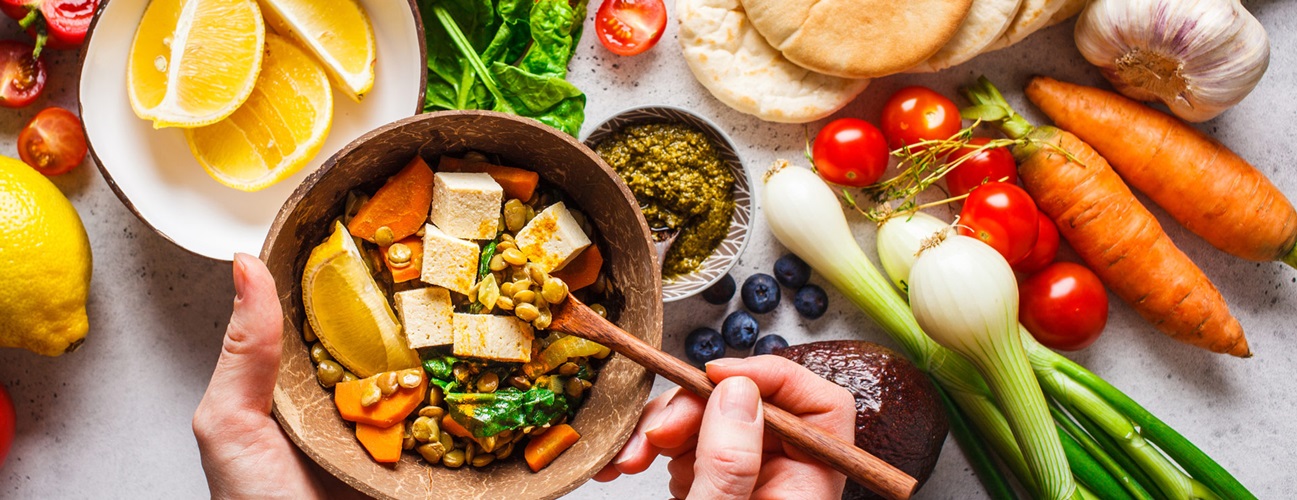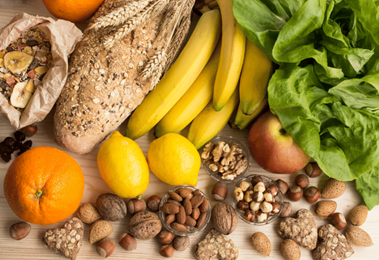Nutrition FAQs: The Answers May Surprise You
Food misunderstandings are common. With so much conflicting information out there, it can be hard to know what’s healthy and what’s hype. Dietitian Gabrielle Judd, M.S., R.D., C.N.S.C., L.D.N., C.I.S.S.N. of Johns Hopkins Bayview Medical Center, clears up some common controversies about what to eat.
How much protein do I need?
Judd says a good guideline for protein for healthy adults is 1 gram of protein for every 2 pounds of the person’s weight. “With that in mind, an adult weighing 150 pounds would aim for about 75 grams of protein each day,” Judd says. “An even easier approach is having protein account for one-quarter of each meal, or 25% of your plate.”
After a point, more is not better, she says. Overdoing protein is possible, especially if you have certain health problems. “One gram per pound of weight may be too much for generally healthy adults,” Judd says. She recommends that people consult with their doctor or dietitian before making major dietary changes.
Are plant-based milks as nutritious as dairy products?
No, says Judd: “All milks have a place, but milk alternatives provide different nutrients. Dairy milk provides the most protein, but it also contains animal fat, which is a concern unless you use 1% or skim milk. Next best in protein is soy milk. Almond milk and oat milk are both low in protein. Almond milk’s calories come mostly from fat; oat milk’s are mostly from carbohydrates.”
Should I switch to organic food?
Judd says the vitamins, minerals, fiber and other nutrients of a fruit or vegetable are the same, whether organic or nonorganic.
However, meat and produce raised organically may help you avoid chemical pesticide and fertilizer residue or added hormones. Current data on health concerns related to these substances is not conclusive. Food safety organizations maintain limits on how much of these chemicals can be present in fruits, vegetables, meat and dairy products. Some people choose organic foods to support more environmentally friendly and self-sustaining farming practices and healthier living conditions for livestock.
Judd adds that organic produce may cost more, since growing food organically is often more labor intensive.
Is honey better than sugar?
“Nutrientwise, they’re the same,” Judd says, adding that agave and other nutritive sweeteners are made of sugars. “All forms of sugars have the potential to add excess calories,” she says. “For a healthy diet, sugars ― including honey ― should make up no more than 5% of your total daily calories.”
What are GMOs?
Genetically modified organisms (GMOs) are fruits, vegetables and grains that have had their genetic code changed in some way through genetic engineering. The genetic modification process is faster than traditional crop breeding methods, such as those that create hybrids.
Here’s what happens: A gene is inserted into the DNA of one cell in a plant, and, as the cell divides and as the plant grows, that gene is present in every cell. A food crop may be genetically modified to improve:
- Flavor
- Nutritional value
- Resistance to disease and pests, so that fewer chemicals are needed
- Shelf life
Eating GMOs will not affect your genes or your DNA, Judd says. “In fact, there is no evidence that GMO foods will hurt you,” she says. The U.S. Food and Drug Administration (FDA), U.S. Environmental Protection Agency and U.S. Department of Agriculture help ensure that GMOs are safe for human, plant and animal health. These agencies also monitor the impact of GMOs on the environment.
Judd notes that more genetically engineered food may emerge to meet the nutrition needs of a growing world population and to address the effects of a changing climate, pointing out that the FDA just approved lab-grown chicken meat.
What are green powders? Should I use them?
Green powders are supplements that contain dried and powdered greens and other vegetables. Some contain grains and fruit as well. “We recommend green powders only as a last resort for people who absolutely will not eat actual vegetables,” Judd says.
“Eating unprocessed vegetables and fruits gives you better nutrition in a form your body prefers,” she adds. “In particular, fiber found in whole, fresh produce gives you several health advantages, supporting gut and cardiovascular health while helping to lower cholesterol and control blood sugar spikes.
“Eating vegetables and fruit also helps you feel full so you feel satisfied eating less, which can help prevent obesity.”
Juicing versus drinking smoothies — which is better?
Judd says tossing whole fruits and veggies into a blender gives you better nutrition than juicing: “When you squeeze juice out of fruits and vegetables, you’re getting some nutrients but leaving behind a lot of good stuff in the juicing machine, especially pulp and fiber.”
Does blending fruit destroy nutrients? “No, blending in a smoothie does not break down the nutrients sufficiently to affect their value,” she assures.
Learn more about making healthy smoothies.
Do detox drinks work?
Judd says no. “There’s no such thing as ‘detoxing’ by drinking vinegar or anything else,” she says. “Your liver and kidneys remove toxins from the body for you.” Here’s more about liver detoxes.
Which is better for weight loss: calorie counting or intermittent fasting?
Both can work, but neither is a silver bullet for obesity in all people. “When you’re trying to lose weight,” Judd says, “the best choice is the one that works for you.
“There is mixed research in terms of weight loss for various diet approaches. The issue with intermittent fasting is that some people binge on fast food and high-calorie items during their nonfasting times, and this will not result in weight loss or benefit your health.”
Are nonnutritive sweeteners dangerous?
There is no definite evidence that FDA-approved sugar substitutes are dangerous, even after extensive testing. Nonnutritive (sugar free) sweeteners include chemical options made in a lab, such as aspartame, sucralose and acesulfame potassium (Ace-K), and those made from plants, such as stevia and monk fruit.
Judd says that despite rumors to the contrary, fake sugar does not contribute to obesity or diabetes. “Any nonnutritive sweetener does help long term weight loss,” she says. “Studies suggest that using them reduces overall intake and cravings for sugar. People who feel strongly about not using saccharine or aspartame may try stevia or monk fruit.”
Does eating right before bed cause weight gain?
Unless it involves packing more calories into your diet, eating just before going to bed does not cause weight gain, says Judd. “It’s not when you eat, but what and how much,” she says. Late night snacking can add pounds when people get into the habit of munching calorie-dense, low nutrition snacks when they’re relaxing in front of the TV before bed.
“Your digestive track and metabolism still work when you’re asleep,” Judd says, but she notes, “Eating late at night, right before bedtime, can cause symptoms for people who have upper gastrointestinal issues such as a reflux disorder (GERD).”






